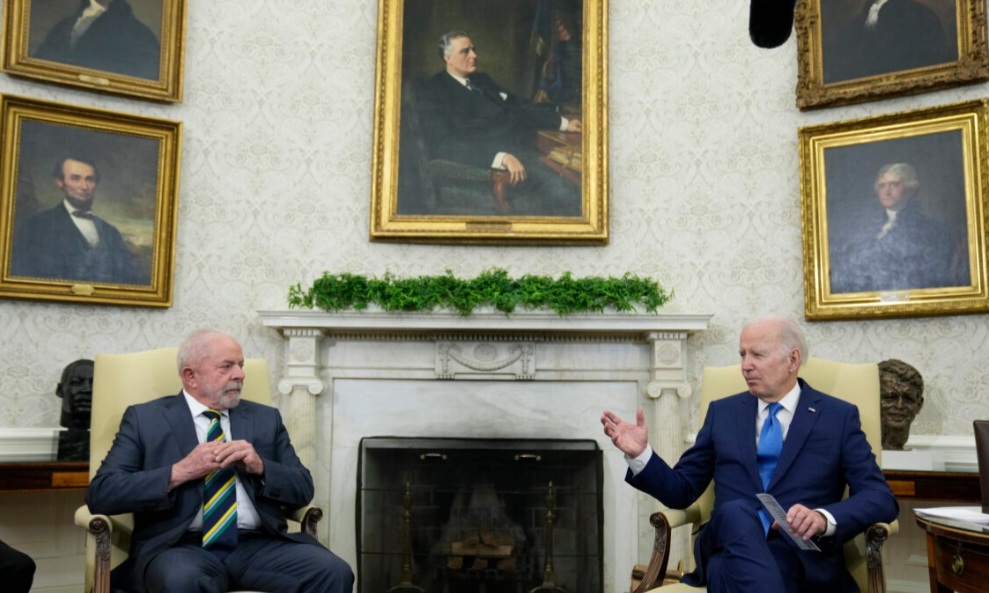By: Khushbu Ahlawat, GSDN

For the first time, the US President Joe Biden welcomed a head of state with whom he could compare notes about experiencing a bloody uprising. As he sat with the Brazilian President Luiz Inacio Lula da Silva in the Oval Office, Biden stated, “Both our nations’ robust democracies have been challenged lately, very much tested, and our institutions are put in risk. But democracy won out in both the United States and Brazil”. And he also welcomed the second summit of democracy to be held in March 2023. The United States and Brazil stand together in rejecting political violence and valuing our democratic institutions, he added.
The outburst in Brazil on January 08, 2023 resembled a South American version of the attack in Washington on January 06, 2021 when hundreds of Trump supporters broke into the Capitol and attempted to halt the counting of the electoral votes that confirmed Biden’s victory. The Brazilian mob, which backed former president Jair Bolsonaro, a far-right figure known as the Trump of the Tropics and a friend of Donald Trump, rampaged into government buildings in an effort to force the military to overthrow the leftist Lula. In the Oval Office on Friday, Lula criticized his predecessor in harsh words while thanking Biden for his “solidarity” throughout the crisis last month.
After four years of occasionally erratic foreign policy under Bolsonaro, Lula’s meeting with the two leaders, just 40 days into his presidency, was framed as a renewal of ties between the two biggest nations in the Western Hemisphere and demonstrated the warm reception that Brazil’s new president is receiving from leaders around the world.
They talked on how to cooperate and coordinate efforts to advance the human rights agenda on problems including social inclusion and labour rights, gender equality, racial equity and justice, and the defence of LGBTQI+ people’s rights. Additionally, they pledged to revitalise the joint action plan between the United States and Brazil to end racial and ethnic discrimination and advance equality in order to benefit both nations’ marginalised indigenous and racial, ethnic, and ethnic populations, particularly those of African origin.
Both parties emphasised their shared commitment and growing coordination to halt climate change. The protection of the Amazon rainforest was the most important topic on the agenda for their discussions, above and beyond their common experiences and opinions regarding the risks to democracy. Biden crossed his fingers as Lula reaffirmed his nation’s pledge to totally stop deforestation by 2030. They acknowledge the essential role that bilateral and multilateral cooperation between Brazil and the United States, notably within the framework of the Paris Agreement and the UNFCCC, can play. They examine potential areas of collaboration, including preventing deforestation and environmental degradation, advancing the bioeconomy, accelerating the use of clean energy, stepping up adaption efforts, and encouraging low-carbon agricultural practices. The leaders also reaffirmed their commitment to eradicating hunger and poverty, boosting global food security, removing barriers to trade, fostering economic cooperation, and promoting peace and security on a global scale.
There were some differences of opinion, most notably the Russian invasion of Ukraine. Although Lula has denounced Russia’s invasion, he has previously claimed that NATO and Ukrainian President Volodymyr Zelenskyy may be partially to blame. Additionally, Lula has reluctant to provide Ukraine arms in an effort to uphold his neutrality. While Biden has been more sceptical of discussions in the near future given that Russian President Vladimir Putin has showed no interest in putting an end to hostilities, Lula wants to try to assist in mediating peace in the war. They expressed concern about the conflict’s consequences on the world’s food and energy security, particularly in the world’s poorest areas, and they stated support for the Black Sea Grain Initiative’s effective operation.
A results-driven strategy that benefits both countries was also highlighted as being interested in enhancing bilateral cooperation in sectors including commerce and investment, energy, health, science, technology, and innovation, defence, education and culture, and consular affairs. Recognizing the significance of supply chain resilience, particularly in light of the current state of the world, they made a commitment to continue working together in this area through targeted public-private dialogues.

